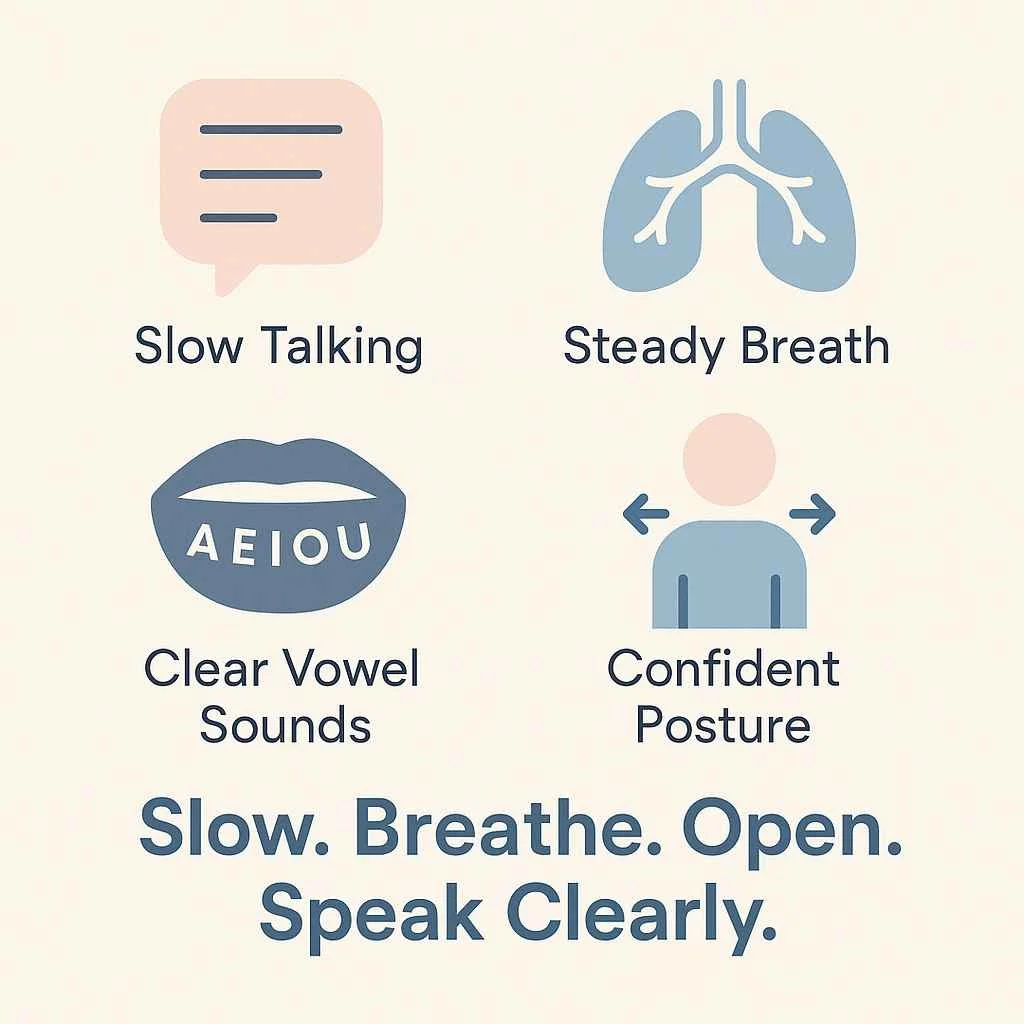How to Improve Enunciation and Speak More Clearly
If you’ve ever been told you mumble or speak too softly, you’re not alone. Many people know exactly what they want to say, but the words don’t always come out clearly. Clear enunciation is not about sounding perfect or formal. It’s about helping your listener understand you without effort so your message lands the way you intend.
This guide gives practical, realistic steps you can start using right away to improve your enunciation and speak with clarity and confidence.
Key Takeaways
Good enunciation depends on steady breath support, clear vowel sounds, and deliberate pacing. Slowing down and opening the mouth slightly wider helps each word stay distinct instead of blending together.
Tongue twisters such as red leather yellow leather, ragged rascal ran, and thirty-three thieves strengthen the mouth muscles used for spoken English. These warm-ups train the tongue, lips, and lower teeth to stop dropping consonants and form single vowels with more clarity.
Recording your voice makes it easier to hear subtle differences in vowels and consonants. This helps identify patterns like rushing, speaking softly, or letting sounds fade at the end of a phrase.
Daily practice speaking out loud supports lasting improvement. Reading aloud, light body language adjustments such as standing straight, gentle breathing exercises, and simple enunciation apps all guide progress. These tools help both native and non-native English speakers build confident, articulate speech at a comfortable pace.
How to Improve Enunciation: Practical Steps That Work
Common Enunciation Mistakes and How to Fix Them
Coaching and Tools That Help Improve Enunciation
When to Consider Professional Support for Enunciation
What Causes Mumbling?
Before improving enunciation, it helps to understand why mumbling happens. Most people don’t mumble because they’re lazy or uninterested. It’s usually a combination of physical habits and communication patterns that have developed over time.
Common causes include:
Speaking too quickly. Rushing through words leads to blurred vowel sounds and dropped consonants.
Limited mouth movement. When the lips, tongue, and jaw move only slightly, sounds stay stuck inside the mouth instead of projecting clearly.
Shallow breathing. Low breath support causes soft speech, fading volume, and unclear word and phrase endings.
Low vocal energy. Tired vocal cords, slouched posture, or low confidence often reduce vocal strength.
Unclear speech models. Growing up around family or peers who mumble can influence how someone speaks without them realizing it.
Accent patterns. Both native and non-native English speakers may have sound patterns that cause certain consonants or vowels to blend.
Habit. Once mumbling becomes a default pattern, the muscles adapt to that comfortable, small range of motion.
Speech Therapy for Adults Who Mumble
Check out our blog on speech therapy for adults who mumble for more information.
How to Improve Enunciation: Practical Steps That Work
Proper enunciation comes from consistent habits and small changes that strengthen the muscles used for speech. These steps help build clarity, confidence, and control.
1. Slow Down and Take a Deep Breath
Good enunciation begins with steady breath support. A slow, full breath gives the voice more strength and helps each word stand on its own. Speaking too quickly often causes vowel sounds to blur and consonants to disappear, so a calmer pace keeps phrases clear and intentional.
2. Open the Mouth Wider
Mumbling often comes from limited mouth movement. Opening the mouth just a bit wider lets sounds travel forward instead of staying trapped behind the teeth. This simple adjustment improves clarity right away, especially for single vowels and final consonants.
3. Warm Up the Tongue, Lips, and Jaw
Practice tongue twisters such as red leather yellow leather, ragged rascal ran, thirty-three thieves, or rugged rocks train the tongue and lips to move with more precision. These exercises serve as a warm-up, helping the muscles produce cleaner consonants and sharper vowel sounds. Even a few minutes a day can make speech feel stronger and more controlled.
4. Practice Reading Aloud
Reading aloud forces the mouth to shape every word. It highlights parts of speech that tend to get rushed, dropped, or softened. This practice builds awareness of pronunciation, phrasing, and natural pacing.
5. Record and Listen
Recording a short message and listening back helps identify subtle differences in vowels, consonants, and overall clarity. This makes it easier to notice patterns like fading volume, slurred endings, or unclear sounds, and gives a clear direction for what to work on next.
6. Use Simple Enunciation Apps or Tools
Basic enunciation apps, audio notes, or guided breathing exercises support steady improvement. These tools help track progress, reinforce good habits, and maintain consistent practice.
7. Adjust Posture and Body Language
Standing or sitting with relaxed shoulders and an open chest helps the voice project more clearly. With proper body language, vocal cords work more efficiently, the breath flows more easily, and his speech sounds more confident and distinct.
Common Enunciation Mistakes and How to Fix Them
Even motivated speakers fall into patterns that make their words harder to understand. These are the most frequent habits that lead to mumbling, along with simple corrections that make speech clearer.
Dropping Consonants
Many people let consonants fade at the beginning or end of words, especially t, d, g, k, and s. This makes speech sound soft or incomplete.
Fix:
Lightly tap the tongue to the teeth or the roof of the mouth when forming final sounds. Slowing down and opening the mouth a little wider helps each consonant land cleanly.
Blurred Vowel Sounds
When the mouth barely moves, vowel sounds blend together. This affects clarity for both native and non-native English speakers.
Fix:
Practice shaping single vowels, ee, ah, oh, oo, with exaggerated mouth movement. Reading aloud helps reinforce clearer vowel placement.
Speaking Too Fast
Fast speech squeezes sounds together, shortens breath, and reduces volume. The voice becomes harder to follow, and listeners work harder to understand the message.
Fix:
Pause briefly between phrases. A steady, calm pace keeps words distinct and helps the breath support the voice.
Talking With a Closed Mouth
Limited jaw and lip movement create muffled speech. Many teens and adults tend to speak with their lips barely parting, especially when feeling tired or self-conscious.
Fix:
Use warm-up lines to activate the jaw and lips. These exercises build the habit of opening the mouth naturally during conversation.
Weak Breath Support
Shallow breathing leads to soft, low-energy speech. This causes fading volume, unclear endings, and poor projection.
Fix:
Take a slow breath that expands the ribs and belly before speaking. Breathing exercises help maintain steady airflow so phrases sound stronger and more intentional.
Flat or Low Vocal Energy
Slouching, low volume, and reduced vocal cord vibration make the voice sound dull and less confident.
Fix:
Stand or sit upright with relaxed shoulders. A more open posture helps the voice carry and keeps speech clear without extra effort.
Coaching and Tools That Help Improve Enunciation
Improving enunciation becomes much easier with structured guidance and the right tools. Coaching, apps, and simple at-home supports help build stronger habits and make practice more consistent.
Communication Coaching
Working with a communication coach or accent coach provides clear direction for what to practice and how to practice it. Coaching focuses on breath support, vowel shaping, consonant precision, pacing, and overall clarity.
Coaches often help identify patterns such as dropping consonants, speaking too softly, or moving the mouth too little. With personalized feedback, progress becomes faster and more noticeable.
Guided Enunciation Apps
A variety of enunciation apps offer short exercises, vowel drills, and pronunciation models. These tools help with single vowels, consonant placement, pacing, and clarity.
They can also help non native English speakers hear subtle differences that native speakers might overlook. Consistent use supports stronger mouth muscles and steady progress.
Voice Recording Tools
Recording short sentences or tongue twisters makes it easier to hear what needs adjustment. Patterns like blended vowels, soft endings, or unclear consonants stand out more on playback. This creates a clearer path for what to work on in daily practice.
Reading Aloud Tools
Simple reading-aloud apps or built-in phone features help pace speech and keep words distinct. Some allow tracking speed, pausing, or repeating lines to strengthen mouth movement and breath control.
Structured Practice Guides
Printable practice sheets, warm-up lines, and tongue-twister lists give a clear structure for daily work. Regular use strengthens the tongue, lips, jaw, and soft palate, so sounds come out cleanly without extra effort.
When to Consider Professional Support for Enunciation
Improving your own enunciation can be helpful, but there are times when guidance from a communication coach makes progress faster and more noticeable. Support can be especially useful when unclear speech starts to affect confidence, school participation, work communication, or everyday conversations.
Professional help may be worth considering if people frequently ask you to repeat yourself or say your words sound soft or unclear. This usually means that pacing, breath support, or mouth movement needs targeted practice. Coaching is also valuable when mumbling begins to affect your confidence.
Many adults and teens pull back from reading aloud, participating in class, sharing ideas, or speaking in groups because they worry they won’t sound clear. A coach provides structure, encouragement, and specific techniques that make speech more articulate without forcing you to sound unnatural.
Some patterns, such as dropping consonants, blending vowel sounds, or speaking with very little mouth movement, can be challenging to correct on your own. A trained coach can identify these patterns quickly and guide you through exercises that help each word sound more distinct.
Coaching is especially helpful for both native and non-native English speakers who want clearer spoken English without losing the natural qualities of their voice or accent.
Support can also make a meaningful difference when preparing for auditions, presentations, interviews, or on-camera speaking. Clear enunciation helps the voice carry, strengthens delivery, and makes messages easier to follow. If practice at home hasn’t led to improvement, a coach can step in with targeted strategies that create steady, lasting change.
Frequently Asked Questions on Improving Enunciation
1. How can I improve enunciation quickly?
You can improve enunciation quickly by slowing your pace and opening your mouth wider. These steps improve vowel and consonant clarity right away. You can add breathing exercises to steady your voice. Short daily practice sessions help your sounds stay distinct.
2. Why do I drop consonants when talking fast?
You drop consonants because your mouth muscles cannot match your speaking speed. Fast talking reduces control of your tongue, lips, and teeth. Slow practice helps you rebuild accuracy. Tongue twisters strengthen your movement for better results.
3. Do tongue twisters really help improve speech?
Sometimes! Tongue twisters can help improve speech by training clear, precise movement. They challenge your tongue and lips in quick sound shifts. Slow repetition builds accuracy. These lines help you note small differences in your sound.
4. How can non native English speakers improve spoken English clarity?
Non native English speakers can improve clarity by focusing on vowel sounds and final consonants. These areas change meaning and affect how words are heard. Listening to native speakers helps you shape your sound. Recording your voice helps you compare patterns.
5. Why is reading aloud helpful for enunciation?
Reading aloud helps enunciation because it builds strong sequences of vowels and consonants. It teaches your muscles how to move through lines smoothly. Daily reading builds better control. It also improves confidence in your speaking voice.
How Connected Speech Pathology Can Help
Connected Speech Pathology provides online communication coaching for adults and teens who want clearer spoken English and stronger enunciation. Coaching sessions focus on practical techniques that strengthen breath support, sharpen vowel and consonant clarity, and build natural pacing.
You receive clear, supportive feedback from a communication specialist who helps you practice the habits that make your speech sound confident, distinct, and easy to understand.
Summary
Clear enunciation grows through steady practice and awareness of how your mouth forms sounds. Slow pacing, open-mouth movement, and careful listening improve speech in daily conversation.
Exercises like tongue twisters, vowel practice, and breathing work support progress. You can start with simple steps and build confidence over time.
About the Author
Allison Geller is a communication coach, speech-language pathologist, and founder of Connected Speech Pathology, an international online practice providing professional communication coaching and speech therapy for children, teens, and adults. With more than two decades of experience, she has worked in medical and educational settings, published research on aphasia, and leads a team of specialists helping clients improve skills in public speaking, vocal presence, accent clarity, articulation, language, fluency, and interpersonal communication.










